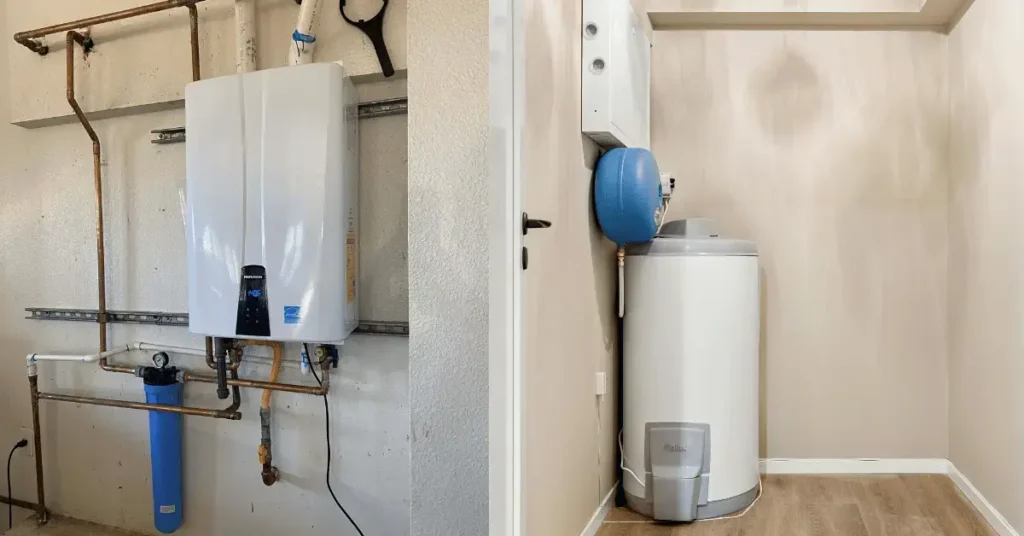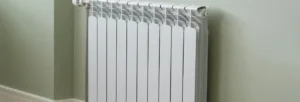Quick Answer: For most Independence, MO homes, a tankless water heater offers better efficiency, lower long-term energy costs, and unlimited hot water on demand, while a traditional tank water heater remains more affordable upfront and simpler to install. The right choice depends on your household size, water usage patterns, and budget for installation and maintenance.
Understanding the Basics of Water Heaters
Before diving into the comparison, it’s important to understand how each type of system works:
Tank Water Heater (Storage Type)
Stores 30–80 gallons of hot water in a tank and keeps it heated around the clock.
Tankless Water Heater (On-Demand Type)
Heats water instantly as it flows through the system, no storage required.
Both serve the same purpose: reliable hot water for your home. But the differences in design lead to variations in cost, performance, and longevity that matter greatly for Independence homeowners.
Tank vs Tankless Water Heater: Quick Comparison Table
| Feature | Tank Water Heater | Tankless Water Heater |
|---|---|---|
| Heating Method | Heats and stores water continuously | Heats water only when needed |
| Upfront Cost | $800–$1,800 (including installation) | $2,500–$5,000 (including installation) |
| Energy Efficiency | 60–65% | 90–98% |
| Lifespan | 8–12 years | 20+ years |
| Space Requirement | Large tank (needs utility area) | Compact and wall-mounted |
| Hot Water Supply | Limited by tank size | Endless (on-demand) |
| Ideal For | Small to mid-size households | Medium to large, high-demand homes |
Energy Efficiency and Performance
The tankless system’s main advantage is efficiency. Since it doesn’t continuously heat water, it can reduce energy use by 25–35% compared to traditional tank models.
For homes in Independence’s variable climate, this efficiency translates to lower gas or electricity bills, especially when hot water demand is spread throughout the day.
However, a tank heater still holds an advantage during peak demand hours, multiple showers or laundry loads may temporarily exceed a single tankless unit’s flow capacity.
Pro Tip: If you have a large household, consider installing two smaller tankless units instead of one large one for balanced pressure and temperature control.
Installation and Cost Differences
Installation cost often determines which system homeowners choose.
Tank Water Heater Installation and Cost Differences
Average cost: $800–$1,800
Usually fits into existing plumbing
Shorter installation time (3–5 hours)
Tankless Water Heater Installation and Cost Differences
Average cost: $2,500–$5,000
May require electrical upgrades or venting modifications
Installation takes longer (6–10 hours)
Despite the higher initial cost, tankless models recover that investment over time through lower utility bills and a longer lifespan. Still, if your existing water heater is nearing the end of its life, replacing it with another tank model is quicker and cheaper.
Lifespan and Maintenance
Tank heaters last around 8–12 years with proper maintenance.
Tankless systems can last 20 years or more, thanks to reduced corrosion and modern heating components.
Maintenance Tips
Flush your tank or heat exchanger annually to remove sediment buildup.
Inspect anode rods (for tank units) every 2 years.
Clean air intake filters and descaling systems for tankless models.
If you notice slow heating or temperature fluctuation, contact your Plumber Independence MO professional to perform a full diagnostic inspection.
Water Quality and Consistency
Hard water in Independence can lead to mineral buildup inside tanks or heating elements. Over time, this buildup causes efficiency loss and inconsistent water temperatures.
Quick Fixes:
Install a water softener or filtration system.
Use a descaling solution every six months for tankless systems.
Tankless models are more sensitive to hard water, so annual flushing is non-negotiable.
Environmental Impact
Tankless water heaters have a smaller carbon footprint because they heat water only when you need it. Independence homeowners aiming to reduce their environmental impact and qualify for energy-efficiency rebates often choose tankless units.
Tank-based systems, though less eco-friendly, can still be upgraded with high-efficiency ENERGY STAR models for better performance.
Cost of Operation and Energy Savings
Let’s compare average annual costs in Independence, MO:
| Water Heater Type | Annual Energy Cost | Average Lifespan | Total Lifetime Cost (Est.) |
|---|---|---|---|
| Tank (Gas) | $400–$550 | 10 years | ~$5,000 |
| Tankless (Gas) | $200–$300 | 20 years | ~$4,000 |
That’s roughly $100–$250 in savings per year for tankless systems.
Over two decades, that’s a $2,000+ advantage — even after factoring installation costs.
Comfort and Hot Water Availability
Tank heaters deliver hot water quickly but can leave households running out of hot water fast during periods of heavy use.
Tankless systems never run out, but there’s a brief delay (2–5 seconds) as the unit heats incoming water.
Best for You If:
You prefer instant, unlimited hot water → Tankless
You want low upfront cost and simplicity → Tank
Either option can integrate easily with your heating system if properly installed.
Safety and Local Code Compliance
Tankless units are generally safer, no risk of tank explosion or standing water leaks. However, both systems require:
Proper venting
Gas line inspection
Annual maintenance to prevent overheating
If you smell gas near water heater, turn it off immediately and call your utility provider or a professional plumber.
Local Climate Considerations (Independence, MO)
Independence’s cold winters mean incoming water temperatures can drop to 45°F or lower. Tankless systems may struggle slightly in extreme cold unless they have freeze protection or preheating features.
Tips for Cold Weather:
Insulate pipes and vent lines.
Choose a condensing tankless model for higher efficiency in cold months.
Keep utility rooms above 55°F.
This ensures both tank and tankless systems operate smoothly during Missouri winters.
Space and Home Design
If your home has limited space, tankless water heaters are clear winners. They mount on walls and free up floor area, perfect for basements, garages, or small utility closets.
Traditional tanks, on the other hand, may require dedicated space near your air conditioning unit or furnace. Compact condos or modern remodels benefit greatly from tankless installations.
Pros and Cons of Each Heater Type
Tank Water Heater Pros
Lower upfront cost
Simpler maintenance
Compatible with existing plumbing
Consistent hot water for small homes
Tank Water Heater Cons
Runs out of hot water
Higher monthly energy use
Shorter lifespan
Tankless Water Heater Pros
Endless hot water supply
Compact and energy-efficient
Long lifespan and rebates available
Tankless Water Heater Cons
Higher upfront cost
May need electrical/gas upgrades
Slight delay before hot water flow
Choosing Based on Family Size and Usage
1–2 people: Small tank or single-point tankless
3–4 people: Medium tank (50 gallons) or whole-home tankless
5+ people: Two tankless units or hybrid system
Families using multiple showers, dishwashers, or laundry cycles simultaneously benefit more from tankless or hybrid systems.
Local Rebates and Incentives
Independence and Missouri residents may qualify for:
Federal energy tax credits (up to $600)
Local utility rebates for high-efficiency water heaters
Installation discounts during seasonal upgrade programs
Check with your utility company or your water heater installation expert for current offers.
Common Myths About Tankless Water Heaters
Myth: Tankless systems don’t provide enough hot water.
Fact: Properly sized units can support multiple fixtures at once.Myth: They’re too expensive to install.
Fact: Long-term savings often offset initial costs within 5–7 years.Myth: Tankless units are only for new homes.
Fact: Retrofitting older Independence homes is now common with modern venting kits.
When to Replace or Upgrade
If your hot water tank vs tankless debate comes down to age, remember:
Replace tanks older than 10 years.
Upgrade if you’re constantly running out of hot water.
Consider a tankless conversion if your energy bills keep rising.
For any leaks, corrosion, or erratic heating, call a professional plumber for inspection.
Final Thoughts: Which One Works Best for You?
For Independence, MO homeowners, the choice between tank vs tankless water heater depends on your priorities:
Choose tankless for long-term efficiency, space savings, and unlimited hot water.
Choose tank for lower upfront costs and simplicity.
If you’re unsure, talk to a trusted local expert who understands both systems and Independence’s plumbing conditions.
Call Duty Calls Plumbing and Rooter LLC
At Duty Calls Plumbing and Rooter LLC, we help Independence homeowners choose, install, and maintain the right water heating solution for their lifestyle and budget. Whether it’s a tankless upgrade, leak repair, or efficiency inspection, our licensed plumbers can help.
📞 Call (816) 945-2131 today to schedule your consultation or same-day water heater service in Independence, MO.
Frequently Asked Questions
What gas line size is usually needed when switching from a 40–50 gal tank to tankless?
Many whole-home tankless systems need 3/4″ supply and often upsizing to 1″ near the unit depending on BTU load and pipe length. Always do a BTU load and pressure drop calculation first.
Will a tankless water heater work during a power outage?
Not without backup power. Even gas tankless units need electricity for the control board and ignition. A properly sized UPS or generator keeps it operating safely.
What is the minimum flow rate to activate a tankless, and why does it matter for low-flow fixtures?
Activation is commonly 0.3–0.6 GPM. Very low-flow fixtures might not trigger the burner, causing lukewarm water. Use compatible fixtures or adjust settings per the manual.
Do heat pump (hybrid) tanks make sense versus tankless in cold garages?
Yes, if the garage stays above ~40–45°F and you have the electrical capacity. Otherwise, a condensing tankless with freeze protection may be more reliable in winter.
What maintenance actually voids warranties on tankless systems?
Skipping annual descaling, failing to clean inlet screens, or ignoring hard-water treatment requirements are common reasons. Keep documented service records.
Why does my water turn briefly cold mid-shower with tankless (the “cold-water sandwich”)?
Short intermittent draws leave an unheated slug in the line. Add a small buffer tank, smart recirculation, or choose a model with anti-sandwich control.








